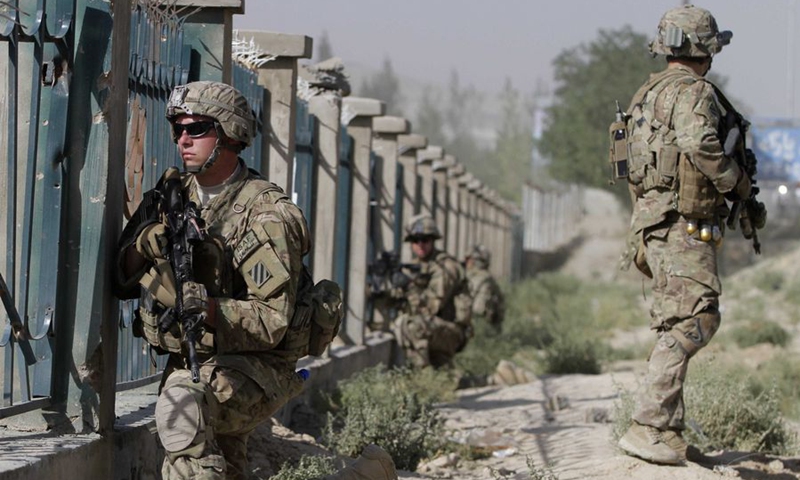OPINION / VOICES
US courtship of Pakistan opportunistic after pullout from Afghanistan

Photo taken on Sept. 8, 2013, shows American soldiers patrol in Afghanistan.(Photo: Xinhua)
With an eye toward getting Pakistan to do more to help stabilize the Afghan situation after the withdrawal of US and NATO forces, the US has courted Pakistan recently. US Secretary of Defense Lloyd J. Austin III on May 24 spoke by phone with Pakistan's Chief of Army Staff, General Qamar Javed Bajwa. During the call, Austin reiterated his appreciation for Pakistan's support for Afghanistan peace negotiations and expressed his desire to continue to build on the US-Pakistan bilateral relationship. One day before, US national security adviser Jake Sullivan met his Pakistani counterpart, Moeed Yusuf, in Geneva, the first in-person high-level contact between the two countries since the Biden administration assumed office in January.
The US is courting Pakistan because it is attempting to find a new fulcrum through which it can influence the Afghan situation after its pullout. The US wants to find a stronghold in Afghanistan's neighboring countries or in Central Asia that can help prevent Afghanistan from sliding to civil war or prevent US influence in Afghanistan from being marginalized.
US-Pakistan relations have been stalled in recent years thanks to the US' increased support to India. But with US troops leaving Afghanistan, Washington has increasingly become aware that it must gain the support of Pakistan in order to retain its influence on Afghanistan. Therefore, it has ramped up interactions with Pakistan.
The Pentagon announced it is looking for military bases in the region to monitor and prevent Afghanistan's re-emergence as a hub of terrorism and anti-US activities. It is likely that Washington is testing Pakistan's reaction to see to what extent Pakistan will support its Afghanistan-related activities in the post-withdrawal era.
Pakistan last week denied the presence of any US military or air base in the country in the future. Pakistan's decision is understandable. Pakistan is a country that firmly defends its sovereignty and rejects foreign interference, therefore Pakistan will certainly not allow the US to operate a military base on its territory. If it gives the US access to its bases, this will cause nothing but harm to Pakistan. For one thing, Pakistan will become a target of Afghanistan's anti-US extremist forces, for another, the decision to allow the presence of a US military base will cause a strong backlash from the Pakistani people.
Washington hopes Islamabad will do more on the Afghanistan issue in the post-withdrawal era. In fact, Pakistan has maintained a very prudent attitude. It is unwilling to behave as if it has much say on the Afghanistan issue as doing so will increase its burden.
Former US President Trump accused Pakistan of not doing enough in return for years of US military aid during his tenure. Now the Biden administration seeks a courtship with Pakistan in an attempt to make it play a bigger role in the Afghanistan issue. This shows Washington's utilitarianism.
The US' regional policies merely serve its own geostrategic interests. Washington takes advantage of allies and partners to fulfill its own interests and abandon them when they are deemed useless. Pakistan was once a non-NATO military ally of the US at the beginning of the war in Afghanistan, but with the US leaning to make use of India to implement its Indo-Pacific Strategy, it to some extent abandoned Pakistan. It is fair to say the US' policies on Afghanistan, Pakistan, India or even the whole of South Asia are opportunistic, the purpose of which is to maintain the US regional and even global hegemony.
The US courtship of Pakistan may help promote a rapprochement in US-Pakistan relations. But the US' current South Asia strategy tilts toward India. Pakistan knows well that it weighs less on the balance of the US. Besides, the US tends to view Pakistan from the Afghan prism, which is entirely designed to serve US interests. Therefore, Pakistan has limited expectations of US-Pakistan ties and it will be difficult to improve bilateral relations.
The fourth China-Afghanistan-Pakistan Trilateral Foreign Ministers' Dialogue will be held on Thursday. The three foreign ministers will have in-depth exchanges of views on the key issues of peace and the reconciliation process in Afghanistan, and trilateral practical cooperation and anti-terrorism security cooperation. Pakistan and Afghanistan are both China's neighbors. The stability of both countries is directly related to that of China's western region. Different from the US, China hopes from the heart that Pakistan and Afghanistan can maintain stability, development and prosperity. The China-Pakistan-Afghanistan trilateral cooperation mechanism could help narrow the differences between Afghanistan and Pakistan and persuade both sides to focus on jointly safeguarding regional security. China has sound relations with both countries and it has a unique advantage to help address the Afghanistan issue.
The author is head of the Department for Asia-Pacific Studies at China Institute of International Studies. opinion@globaltimes.com.cn
